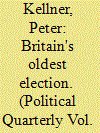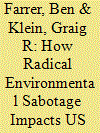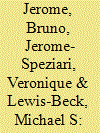|
|
|
Sort Order |
|
|
|
Items / Page
|
|
|
|
|
|
|
| Srl | Item |
| 1 |
ID:
092641


|
|
|
|
|
| Publication |
2009.
|
| Summary/Abstract |
Fringe political parties did well in the European Parliament elections in June 2005. The British National party won their first seats; altogether, four in ten British voters supported a party not represented in the House of Commons at Westminster. YouGov questioned more than 32,000 electors at the time of the election, in order to find out who voted for each party and why: the sample was big enough to enable robust analysis to be done on the BNP, UKIP and Green vote, as well as the supporters of Labour, the Conservatives and the Liberal Democrats. YouGov's findings show that there was disillusionment with the traditional main parties, and fears for the future, that were felt by voters across the political spectrum, and not just the supporters of the fringe parties.
|
|
|
|
|
|
|
|
|
|
|
|
|
|
|
|
| 2 |
ID:
188029


|
|
|
|
|
| Summary/Abstract |
In this paper we examine the impact of forceful or violent environmental sabotage (FVES) on U.S. elections. We argue that voters see ideological similarities between groups that engage in FVES and other nonviolent environmental organizations, like the Green Party. This means that when an environmentalist organization engages in FVES, it has a negative impact on voter attitudes toward all environmental organizations. Moreover, this negative impact will be stronger if environmentalists had previously made electoral progress, and so they cannot use the excuse that democratic methods had failed and they were forced to turn to FVES. We demonstrate this by showing that when FVES occurs, Green Party candidates tend to win a lower share of the vote in the next election. However, this effect is conditional on the prior electoral history of the Green Party. If the Green Party has a poor electoral record, then sabotage has little effect, but if the Green Party has a better electoral record, then voters are less forgiving of sabotage. We find no evidence that FVES effects Republican or Democratic vote shares. We conclude that different organizations within the same social movement are connected in ways that impact electoral outcomes.
|
|
|
|
|
|
|
|
|
|
|
|
|
|
|
|
| 3 |
ID:
126326


|
|
|
|
|
| Publication |
2013.
|
| Summary/Abstract |
Our political economy model has correctly forecasted the 1998 and 2005 elections. However, in 2002 we predicted a tight race to the benefit of the Christian Democrats(CDU)/Christian Socialists(CSU)-Free Democratic Party (FDP) opposition, so underestimating the narrow defeat of the FDP by the Green Party. In the German political system, proportional representation makes single-party domination almost impossible. On the contrary, the big parties, Social Democratic Party (SPD) or CDU/CSU, are pushed to build a majority coalition. In this competition, the FDP has been the "pivotal party" in German political life, at least until 2002. Since then, the Greens have challenged the FDP, with the Ecologists allowing the SPD to form a red-green coalition in 1998 and in 2002. Similarly, in 2005 the FDP was not associated with the grand coalition driven by Angela Merkel.
|
|
|
|
|
|
|
|
|
|
|
|
|
|
|
|
|
|
|
|
|